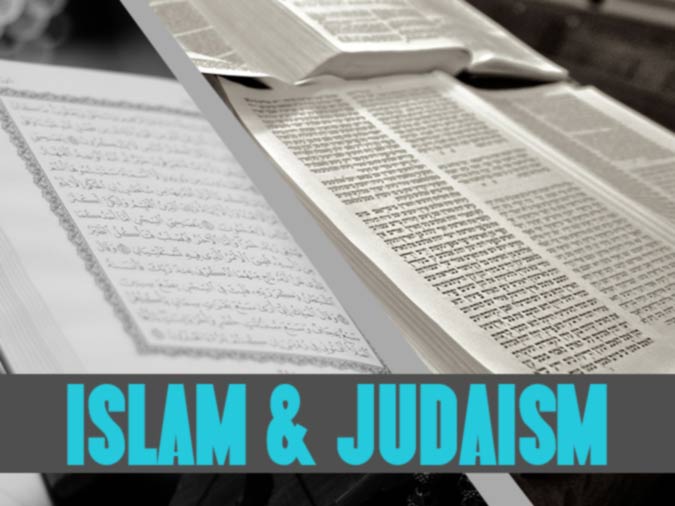Islam and Jewish similarities and differences
Similarities between Islam and Judaism5 min read
Do Islam and Judaism have anything in common? Are they two religions that are radically different and at constant odds? There is a common perception that Muslims and Jews have been at odds for hundreds of years. Consequently, it is often stated that the “Muslim-Jewish conflict” can never be resolved. However, this is historically inaccurate. People mistakenly conflate the Israeli-Palestinian conflict with Islam and Judaism. Even then, the Israeli-Palestinian conflict started in 1948, prior to that there were very few wars between Muslims and Jews. This is not meant to downplay the conflicts that do occur, but to contextualize them historically. These two faiths share more in common than many might initially think. With the rise of anti-Semitism and Islamophobia around the world, it is important to understand what these two faiths have in common.
The Qur’ān refers to Jews and Christians as people of the book. This means that they have a special place and treatment because of their similar beliefs with Muslims. Many might be surprised to know that Islam allows Muslim men to marry Jewish or Christian women. Further, Islam allows Muslims to eat meat that was properly slaughtered by a Jew or Christian. The two faiths are not as radically different than some might expect. The purpose of this article is to dispel the myth that Islam and Judaism are completely at odds by highlighting some of the similarities between the two religious traditions.
They worship the same God
Islam and Judaism are resolutely monotheistic faiths. Allah is the Arabic name for God. The Arabic name Allah has linguistic connotations that are not shared with the English term God. For instance, the word Allah cannot be made plural like the word God. Nevertheless, Allah is the same Creator, Sustainer, and Provider that Jews and Christians worship.
Jesus
Because these two faiths are strictly monotheistic in nature, they both do not consider Jesus to be divine. They both consider it blasphemous to attribute a literal son to God. The idea that God has a son is inconsistent with the uncompromising monotheistic message found both in the Qur’ān and Torah. However, unlike Jews, Muslims believe that Jesus is a great Prophet of God who delivered the message of Oneness to the Children of Israel and that his mother Mary was the greatest of all women.
Prophets
Muslims and Jews share beliefs in certain Prophets. They both believe that God sent Prophets to mankind to deliver the message of monotheism. Jews believe that Moses is the greatest of all Prophets who was sent to mankind. Muslims also believe in Moses, who is in fact the Prophet most mentioned in the Qur’ān. Muslims and Jews also believe in Abraham, Noah, David, Solomon, Isaac, Jacob, and Joseph. Because Muslims believe in all Prophets and Messengers, they also believe in the scripture they delivered. Therefore, Muslims believe that Moses was given a book called the Torah. However, they believe this book was not preserved in its original form. For Muslims the Prophet Muhammad, God’s final Messenger to mankind who delivered the final book, the Qur’ān.
Jerusalem
Historically, many of these Prophets resided in the city of Jerusalem. Both Islam and Judaism consider Jerusalem to be a holy city. Prophet Solomon established the first Temple in Jerusalem which made it the religious center for Judaism. Jerusalem is Islam’s third holiest city after Mecca and Medina. Prophet Muhammad was taken on a miraculous journey from Mecca to Jerusalem and then ascended to the heavens.
Circumcision
Islamic law and Jewish law share many things in common. In the Bible, Abraham was commanded to undergo circumcision. This practice has been established among Abraham’s children. The Torah instructs that newborns be circumcised on the eighth day after birth. The command for circumcision is not in the Qur’ān, but the Prophet Muhammad peace be upon him required it for his male followers.
Dietary Restrictions
Jews only eat kosher and Muslims only eat halal. There are many similarities between kosher and halal, and in some cases, kosher is considered halal for Muslims. Some kinds of foods, such as pork, are prohibited in both Islam and Judaism. Other kinds of foods must be prepared in a certain way for them to be permissible for consumption. The animal must be slaughtered properly, mentioning the name of God, and for Jews, the person must be Jewish. However, Muslims are allowed to consume an animal if it is slaughtered by a Muslim, Jew, or Christian.
Female Head Covering
Both religions encourage modesty and require that women cover their hair. This is not meant to detract from women’s beauty, but to channel it to her marriage where it truly belongs. Many married Jewish women wear a scarf to cover their hair. Islam instructs that women wear a headscarf (hijab) after puberty. Along with the head covering, both religions encourage women to dress modestly. This includes wearing long and loose-fitting clothing. Although they both cover in very similar ways, after 9/11 Muslim women have been targeted for their hijabs more than women of other faiths.




.jpeg)

0 Comments:
Post a Comment
Subscribe to Post Comments [Atom]
<< Home